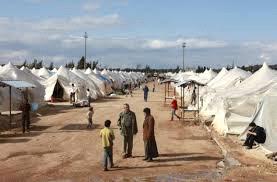Ammon News - Washington post by Michael Gerson - For refugees to arrive at this remote eastern border crossing — about 100 kilometers from Iraq — is itself a feat of courage and logistics. Jordan’s more western crossings, nearer the fighting in Syria, are now, in the term of art, “managed” — meaning only the war wounded are taken in.
Refugees from besieged areas of Daraa, Homs, Aleppo and the suburbs of Damascus skirt government-held regions, pay middlemen for transport, provide bribes at checkpoints and finally walk across a desert no man’s land to arrive in Jordan with little but poignant bundles of blankets and clothing. Most of the refugees are women and children. This batch included a two-week-old baby.
Jordanian border guards are welcoming — sometimes reaching beyond the berm demarcating the neutral zone to help the elderly and injured. After an infusion of bottled water and juice boxes, the new arrivals are transported to a nearby transit center.
The refugees report increasing hunger in parts of Syria. “We were eating grass like goats,” a woman named Rwan told me before boarding a truck. Her 16-year-old son Abad had recently been released after four months in jail for a Facebook posting critical of the regime. He had not been in school for two years. “He is an excellent student,” his mother added.
At the transit center, refugees quickly surround a Westerner with a notepad, anxious to tell their stories. Bread prices beyond reach. Homes destroyed by barrel bombs — filled with fuel oil and metal shards — dropped from helicopters. Regime-allied gangs kidnapping people for ransom. No medicine for heart disease. “We are like people waiting for execution,” said one woman.
A man hung quietly at the back of the scrum. As I made to leave, he asked my translator if he could have a few words. He told me that a tank had fired on his home, killing his 4-year-old daughter and 6-year-old son. Another son, 15, had lost a leg. His house had been targeted, he explained, “because I demonstrated against the regime.” He said to me that he just wanted someone to know.
Back at the massive Zaatari camp, where almost all Syrian refugees are at least temporarily funneled, the stories of recent arrivals are repeated, raw with each telling. Barrel bombs now seem to be the regime’s weapon of choice against civilians, yielding casualties and terror without the public relations drawbacks of chemical weapons. People report summary executions. Routine disappearances and torture. The bombing and shelling of neighborhoods. “We fled our homes to farms,” said one man from Homs, “but the planes kept chasing us.” A refugee from Aleppo told me, “If there were safe passage, no one would remain there.”
President Obama has described this as “someone else’s civil war” and Australian Prime Minister Tony Abbott has dismissed the conflict as “baddies vs. baddies.” Such characterizations are simply inaccurate. The killing of civilians in Syria is not the unfortunate byproduct of a civil war; it is a main objective of one side in that civil war. Some 40 districts , including about a quarter of a million people, are currently under siege by Bashar al-Assad’s forces. The goal is to surround these targets, lay them waste, kill everyone who poses a possible threat and prevent the return of suspect civilians. Both sides in the conflict commit atrocities. One side commits them on a massive scale as a matter of strategy.
This is what brought me to Jordan on a trip hosted by the United States Holocaust Memorial Museum, which has, as part of its mission, the goal of calling attention to modern atrocities and crimes against humanity. Syria has joined an infamous historical list including Bosnia, Kosovo and Rwanda. And the course of the Syrian conflict is currently demonstrating the utility of mass atrocities and the relative indifference of the rest of the world.
The policy implications of this historical fact deserve fuller exploration. But at the very least it means that ad hoc cease-fires are unlikely to succeed, since Assad’s tactics have worked nicely for him. His goal was to enter the Geneva 2 negotiations from a position of military strength in order to deflate hopes of a political transition. His sponsors and allies — Russia, Iran, Hezbollah — have shown no ambivalence, unlike some of the sponsors and allies of his opponents.
These developments should mean something to Mr. Obama, the author of an executive directive (Presidential Study Directive on Mass Atrocities ) declaring the prevention of mass atrocities a “core national security interest and a core moral responsibility.” At the moment, he stands judged by his own standard.
